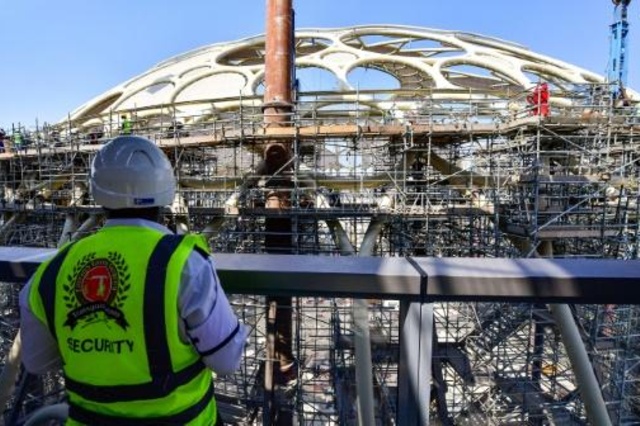FT: Workers at Dubai Expo complain of poor treatment
Claims of recruitment fee payments at ‘world’s greatest show’ underscore concerns for staff welfare in region
Over the past six months, more than 20mn people have visited Expo 2020 in Dubai, but with just days to go before the end of the ‘world’s greatest show’, some of the hundreds of cleaners who have toiled at the exhibition site fear they have little to show for their efforts.
One cleaner who was hired in Ghana described paying hefty recruitment fees to a local agent in order to get the job. Repayments eat into her 1,000 dirhams a month salary, leaving her just Dh200 ($54) to send back to her family, less than she would have saved if she had remained at home.
“My mother told me to come back home — I came to change my environment, but I am better off back in Ghana,” said the cleaner, who works for ADNH Compass, a joint venture between Abu Dhabi National Hotels and the UK-listed Compass Group. Advocacy groups have long criticised the use of recruitment fees, illegal in the United Arab Emirates since 1980 and specifically barred by Expo’s management.
The fees are often repaid over months or years and trap poorly paid migrant workers into contracts. Dozens of workers, mainly cleaners, across the Expo site told the Financial Times they had paid recruitment fees. Others, including security guards, said they had not. Interviews with 69 Expo workers conducted by advocacy group Equidem found that 83 per cent had paid illegal fees or had not received their pay in full and on time. “Practically every major economy in the world is represented at Expo,” said Mustafa Qadri, Equidem’s founder.
“The failure to protect migrant workers from forced labour practices at Expo reflects the international community’s inability to conduct adequate human rights due diligence.” Persistent claims of recruitment fee payments underscore concerns for worker welfare in the resource-rich region, which attracts millions of migrants in search of a better life.
Recruitment fees, debt bondage and non-payment of wages remain commonplace in the UAE, according to the International Trade Union Confederation. Qatar, which has come under sustained criticism over worker rights, has argued that hosting of this year’s Fifa football world cup has prompted better standards, including the introduction of a minimum wage.
“Despite significant attention and effort, recruitment fees remain the norm, not the exception,” in the Gulf, said James Corah, head of sustainability at CCLA Investment Management. The UK-based asset manager leads a collaborative initiative backed by investor assets of more than £7tn calling on companies to find and remedy instances of forced labour.
Workers at Expo hired from countries such as Nepal and Ghana jumped at the opportunity to come to the UAE to support their families and build savings for education or a property. Yet across the site, a couple of dozen cleaners told the Financial Times how they had dipped into savings or borrowed thousands of dollars to pay illegal recruitment fees to agents. Cleaners employed by Swiss-owned Farnek also complained of paying recruitment fees to agents and low pay.
Money paid to recruitment agents from loans or life savings ranged from Dh2,000 to Dh8,000. Some people are still paying back the fees in instalments of up to Dh500 a month, reducing the amount they can remit to families. The payments continue even when the work is over.
Several Indian and Sri Lankan cleaners working for Farnek also said they had paid fees of around Dh5,000 to agents in south Asia. One said he managed to send back around Dh700 a month out of his Dh1,000 salary. “But I owe Dh7,500 and need more money to send back to my large family in Chennai.”
ADNH Compass, which provides free food and accommodation, said any substantiated allegation of paying illegal fees to agencies would be “reimbursed by the agent or us”. Farnek said it does not recruit workers who have paid fees, saying they all must confirm in writing that they have not paid any agency fees.
Expo said some workers believe these payments are necessary to secure employment. Corah welcomed Compass’ steps in addressing labour standards and the firm’s practice of investigating all allegations of recruitment fee payments and reimbursing workers. “In addition to the personal tragedy for workers, the regulatory and reputational risks for companies that get this wrong are growing,” he said. “Investors are watching.”
Expo said issues surrounding pay and recruitment fees are not systemic across the large workforce operating in a place the size of a city, where 100,000 people are on site daily. “While full compliance is not always tenable, Expo 2020 Dubai has set high standards in worker welfare,” it said. “Expo conducts rigorous inspections of its service providers and employees sign an undertaking that they have not paid fees to recruitment agents.” Expo cleaners are paid Dh1,000 a month in accordance with International Labour Organization recommendations.
Farnek said its workers were earning “considerably more” than in their home countries. But many of those workers are now worried about returning home empty-handed. Two ADNH Compass staff said they were told that 650 of the 1,000 Expo cleaners would be let go and repatriated at the end of the month. They later said the company had committed to try to find them new jobs. “Although every effort will be made to redeploy staff post-Expo, there is no guarantee,” ADNH Compass said. “All employees were made aware of this at the time of recruitment.”



